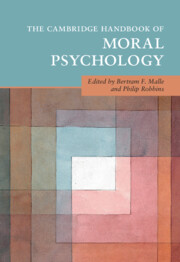Book contents
- The Cambridge Handbook of Moral Psychology
- Cambridge Handbooks in Psychology
- The Cambridge Handbook of Moral Psychology
- Copyright page
- Contents
- Figures
- Tables
- Contributors
- Preface
- 1 Modern Moral Psychology
- Part I Building Blocks
- Part II Thinking and Feeling
- 7 Moral Decision Making
- 8 Are Moral Judgments Rational?
- 9 Moral Categorization and Mind Perception
- 10 Moral Emotions
- 11 The Benefits and Costs of Empathy in Moral Decision Making
- Part III Behavior
- Part IV Origins, Development, and Variation
- Part V Applications and Extensions
- Index
- References
8 - Are Moral Judgments Rational?
from Part II - Thinking and Feeling
Published online by Cambridge University Press: 20 February 2025
- The Cambridge Handbook of Moral Psychology
- Cambridge Handbooks in Psychology
- The Cambridge Handbook of Moral Psychology
- Copyright page
- Contents
- Figures
- Tables
- Contributors
- Preface
- 1 Modern Moral Psychology
- Part I Building Blocks
- Part II Thinking and Feeling
- 7 Moral Decision Making
- 8 Are Moral Judgments Rational?
- 9 Moral Categorization and Mind Perception
- 10 Moral Emotions
- 11 The Benefits and Costs of Empathy in Moral Decision Making
- Part III Behavior
- Part IV Origins, Development, and Variation
- Part V Applications and Extensions
- Index
- References
Summary
This chapter of the handbook posits utilitarianism as a standard of rational moral judgment. The author does not directly defend utilitarianism as a theory but investigates cases of apparent contradiction between people’s moral decisions (sometimes grounded in nonutilitarian principles) and the consequences of those decisions that they themselves would consider worse for themselves and everybody else. For example, when some people use a moral principle (e.g., bodily autonomy) to assertively make a decision (e.g., to not get vaccinated), it has negative moral consequences for others (e.g., infecting people) and for themselves (risking infection). The author asks whether such contradictions in moral reasoning can provide insights into some of the determinants of such reasoning. These insights, importantly, are valuable even for those who do not adopt utilitarianism as a normative model. From over a dozen candidate moral contradictions, the author concludes that many deviations from utilitarian considerations in moral contexts are reflections of familiar nonmoral cognitive biases, but some arise from adherence to strong moral rules or principles (e.g., protected or sacred values).
- Type
- Chapter
- Information
- The Cambridge Handbook of Moral Psychology , pp. 172 - 197Publisher: Cambridge University PressPrint publication year: 2025

